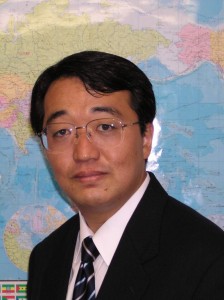緊張と統合:内村鑑三におけるキリスト教と日本の精神
このシリーズでは、私が1994年に執筆した統一神学大学院(Unification Theological Seminary)の神学課程修士論文(Divinity Thesis)を日英二か国語で掲載している。
7.無教会運動の評価の続き
第二の基礎的概念は、もっと説明するのが難しいものである。それは存在の根拠、あるいは実在の内的本質といったもの、と表現することができるであろう。たとえば中国の「道(タオ)」、朱子学派の「理」(英語では、しばしば reason と訳される)、「理」と同義で用いられるときの「心」(英語では、heart もしくは mind )、仏教における「仏性」の概念、そして神道における最も哲学的な意味での「神」という語などである。このような存在に対する宗教行為は、この存在の根拠あるいは実在の本質と、なんらかの形で合一あるいは一致を為そうという、求道者側からの試みなのである。
神に関するこの二つの概念は、互いに相克するものであると考えてはならない。これらは二つともほとんどすべての宗派に見出すことができ、いずれも互いに他を排除するものとは思われない。どのような潜在的な相克も、重層的真理の理論によって解決され、おそらくは第二の神概念のほうがより深遠なるものであると考えられた。しかしながら、禅宗のある極端なものだけは、第一の型の神々をあからさまに否定する。
もし無教会が禅とキリスト教の統合であるならば、それはあきらかに日本における二番目の型の宗教的伝統を代表している。残念ながら、一番目の型の神概念の圧倒的な影響力に比べるならば、第二の型は上流階級の間でごく限られた影響力をもつにすぎなかった。禅宗は基本的に、この世を避けることによって、個人的な修行あるいは宗教体験を通して神的存在との一体化をなそうとする、エリート主義的な宗教である。この見地からすれば、無教会は日本の宗教圏においては少数派にとどまる運命にあったと言えるのである。
結果的に、大多数の日本人の宗教行為は、第一に世俗における自己の義務の遂行という形をとり、祭儀、祈祷、あるいは瞑想などのすべてが、第一義的な倫理的義務に対して、二次的な地位を占めるのみとなったのである。すなわち最も具体的に強調されたのは、政治的上位者に対する義務と、家庭に対する義務であった。
このような「日本的宗教」が究極的に発達したものが、天皇崇拝であり、それは他の全ての宗教的、世俗的献身を凌駕するものであった。この様な忠と孝の同一視と結び付いた天皇への高い崇敬は、国家の概念に対して非常に興味深い意味を持つ。神、天皇、君主、そして父が同意義のものとされる傾向があったのである。天皇は「神」であり、「君主」であり、かつ民族的家庭の「父」である。人民は崇拝者であり、臣下であり、かつ子供である。
以上述べたものは、「国体」の意味の一面である。それは国家にかんする概念であり、その中に宗教的、政治的、および家庭的思想が不可分に融合されている。このようにして、天皇は国家の中心となり、天皇の恩恵に報いるべき義務は、他の全ての義務に優先しているのである。
VII. Evaluation of the Mukyokai Movement.(Cont.)
The second basic conception of the divine is more difficult to explain. It might be described as the ground of being or the inner essence of reality. Examples are the Chinese tao; the neo-Confucian li, often translated as reason, and hsin, heart or mind, when identified with li; the Buddhist concept of the Buddha-nature; and the Shinto term kami in its most philosophical interpretation. Religious action toward these entities is the attempt on the part of the communicant to attain some form of union or identity with this ground of being or essence of reality.
The two conceptions of the divine should not be thought of as competing. They are both to be found in almost every sect and they were not felt to be in any way mutually exclusive. Any potential conflict was resolved by a theory of levels of truth, the second conception of the divine being considered perhaps more profound. Only some of the more extreme forms of Zen, however, radically rejected deities of the first type.(13)
If the Mukyokai is a synthesis of Zen and Christianity, it clearly represents the second type of religious tradition in Japan. Unfortunately, comparing to the overwhelming influence of the first type conception of the divine, the second type had only a limited influence among the upper classes.(14) Zen Buddhism was basically an elitistic religion which seeks to attain unity with the divine through private religious exercise or experiences, through withdrawal from the world. From this viewpoint, the Mukyokai was destined to remain minority in Japanese religious sphere.
Consequently, religious action for the majority of Japanese took primarily the form of fulfilling one’s obligations in the world. Ritual, prayer or meditation all took second place to the primary ethical obligations. What concretely tended to be most stressed was obligation to political superiors and obligation to family.(15)
The ultimate development of this “Japanese religion” was the emperor worship, in which loyalty to the emperor could override other religious and secular commitments.(16) The high regard for the emperor when linked to this identification of loyalty and filial piety has some very interesting implications for the concept of the state. God, emperor, lord, and father tend to be made into equivalents. The whole nation is a single family. The emperor is “divine,” he is “lord” and he is “father” of the national family. The people are worshippers, retainers, and children.
What has been described above is one aspect of what is meant by kokutai (national polity). It is a concept of the state in which religious, political and familistic ideas are indissolubly merged. Thus the emperor becomes the center of the national religion and the obligation to make return for his benevolence takes precedence over all other obligations.(17)
(13)Ibid., p.61.
(14)Ibid., p.74.
(15)Ibid., p.79.
(16)Ibid., p.88.
(17)Ibid., p.103-4.
